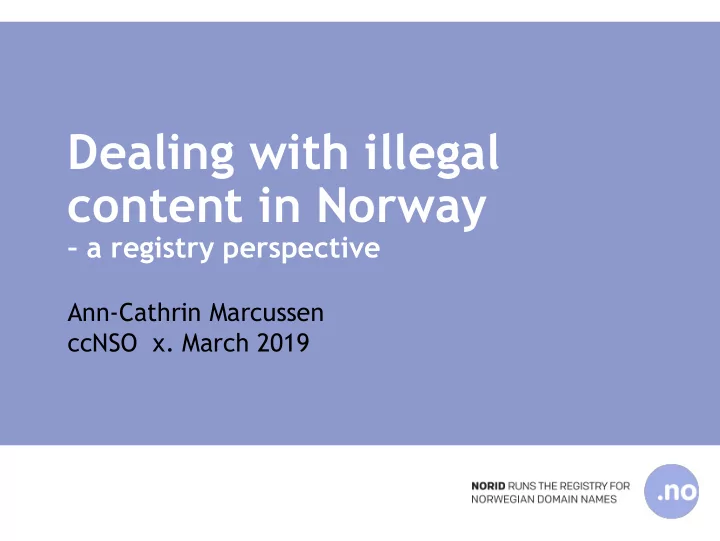

Dealing with illegal content in Norway – a registry perspective Ann-Cathrin Marcussen ccNSO x. March 2019
– There is something we don’t like on the Internet! ˃ Increase in actors that want to block domains or IP-addresses in order to stop illegal or unwanted activity on the Internet 2
Possible measures: acting upon the infrastructure Takedown at source is always most effective, but taking down the ˃ address is sometimes the only available action to local authorities Proportionality: extensive use of takedowns at infrastructure level ˃ damages the value of DNS for everyone 3
Domain names can be seized and forfeited ˃ Domains are created the moment someone subscribes ˃ Domain name holder is given a right of use that lasts as long as the registration exists − Continuous registration as long as terms and conditions are met − Domain holder is responsible for the registration and use of it ˃ Forfeiture of the right to hold the registration pursuant to Criminal Code art 63 to 75 ˃ Right of use of a domain name can be made subject to seizure pursuant to the Criminal Procedure Act (Supreme court decision HR-2009-01692-U) − The registration is seized from the holder − Right of use is transferred to the police for the duration of the case − Police is responsible for the registration − «Normal» domain holder with rights and duties (must pay usual fees) 4
LEA starts a criminal case LEA enters into the registration as holder ˃ If the seizure is lifted, LEA must transfer the registration back ˃ to the original domain name holder If the registration is forfeited: ˃ − The police may terminate the domain registration. The domain returns to the pool of possible domain names that Norid administrates (.no) and is available for new registrations − Alternatively, the registration may be sold on behalf of the state. It is then transferred to a new domain holder ˃ In order to protect potential customers, Norid blocks new registrations of domain names that has had a forfeited registration for a period of two years 5
The role of the registry ˃ We do not judge whether content is illegal... − «Norid does not undertake any control of the content of websites; nor does it have any mandate to react to websites that may appear to violate the law; it is up to the police and the judicial system to do this» (Supreme Court HR-2009-01692-U) ˃ …but we cooperate with law enforcement in order to ensure that there are clear and predictable routines available for those who do have a mandate to deal with illegal content − Routines must take into account proportionality and rule of law − Norid must be able to implement court decisions without having to be part of all court cases where domains are involved 6
Providing information 7
First case of confiscation: forfeiture of popcorn-time.no ˃ 2016 - 2019 popcorn-time.no − LEA (Special Unit Economic Crime) seized the right of holding the domain – transferred to the police for the duration of the case − «If a domain registration is forfeited, the domain will be transferred to Norid. (…) The domain name will then return to Norid’s domain name pool, to subsequently, after a possible quarantine period, be available to the public again» − 2019 Appeal Court of Oslo City court final decision on forfeiture. Practical handling of forfeiture left to the LEA to take steps according to the routine established by Norid 8
Additional information… ˃ Domain name registries and online content (CENTR Document) centr.org/library/library/centr-document/domain-name-registries- and-online-content.html ˃ Domain name conflicts in the legal system (Norid) www.norid.no/en/domenekonflikter/rettslig-behandling/veileder / ˃ Routines and procedures for .no www.norid.no/en/domenekonflikter/ansvar-innhold / ˃ Supreme Court Decision (2009) unofficial translation www.norid.no/domenekonflikter/rettssaker/dommer/hr-2009-01692- beslag-en.pdf 9
Thank you Ann-Cathrin Marcussen acm@norid.no
Recommend
More recommend